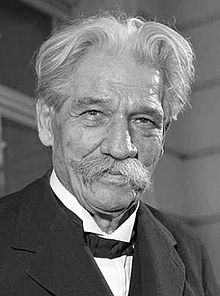Albert Schweitzer
médico, filósofo, teólogo y músico
| Albert Schweitzer | |||||||||||
|---|---|---|---|---|---|---|---|---|---|---|---|
 |
|||||||||||
| Véase también | |||||||||||
| Esta página contiene citas de una persona fallecida hace 59 años. | |||||||||||
| Dependiendo de cómo se publicaran, pueden estar protegidas por derechos de autor. Deben usarse según las políticas de licencias de Wikiquote. | |||||||||||
Albert Schweitzer (Kaysersberg, Alsacia; 14 de enero de 1875-Lambaréné, Moyen-Ogooué, Gabón; 4 de septiembre de 1965) fue un filósofo y científico franco-alemán, Premio Nobel de la Paz en 1952.
Citas
editarNOTA: Salvo en los casos que cuentan con referencia en español, la traducción de las citas incluidas en esta sección es propia del usuario que las aporta.
- «A veces, nuestra luz se apaga, pero se vuelve a encender en llamas instantáneas por un encuentro con otro ser humano».
- Original: «Sometimes our light goes out, but is blown again into instant flame by an encounter with another human being». [1]
- «El éxito no es la clave de la felicidad. La felicidad es la clave del éxito. Si amas lo que haces, tendrás éxito».
- Original: «Success is not the key to happiness. Happiness is the key to success. If you love what you are doing, you will be successful». [2]
- «Hasta que no extienda el círculo de su compasión a todos los seres vivos, el hombre no encontrará la paz por sí mismo».
- Original: «Until he extends the circle of his compassion to all living things, man will not himself find peace». [3]
- «Hay dos formas de refugio de la miseria de la vida: la música y los gatos».
- Original: «There are two means of refuge from the misery of life — music and cats». [4]
- «Los años arrugan la piel, pero renunciar al entusiasmo arruga el alma».[5]
- «Si amas tanto algo, déjalo ir. Si vuelve, estaba destinado a ser; si no es así, nunca lo fue».
- «If you love something so much let it go. If it comes back it was meant to be; if it doesn't it never was». [6]
- «Vivimos en una época peligrosa. El ser humano ha aprendido a dominar a la naturaleza mucho antes de haber aprendido a dominarse a sí mismo».[7]
Referencias
editar- ↑ The Choice for Love: Entering Into a New, Enlightened Relationship with Yourself, Others & the World. Barbara De Angelis. Hay House, Inc, 2017. ISBN 9781401951979. Página 269. En Google books. Consultado el 30 de marzo de 2021.
- ↑ Heavenly Wisdom: Talent, Imagination, Creativity and Wisdom. Dragan P. Bogunovic. Author House, 2013. ISBN 9781481765138. Página 53. En Google books. Consultado el 30 de marzo de 2021.
- ↑ [https://books.google.es/books?id=UqXKKzSdZI4C&pg=PA91&dq=false Review of U.S. Department of Agriculture's Enforcement of the Animal Welfare Act, Specifically of Animals Used in Exhibitions: Hearing Before the Subcommittee on Department Operations, Research, and Foreign Agriculture of the Committee on Agriculture, House of Representatives, One Hundred Second Congress, Second Session, July 8, 1992. United States. Congress. House. Committee on Agriculture. Subcommittee on Department Operations, Research, and Foreign Agriculture, United States Edición ilustrada. U.S. Government Printing Office, 1992. ISBN 9780160391057. Página 91.] En Google books. Consultado el 30 de marzo de 2021.
- ↑ Property Law. D. Benjamin Barros, Anna P. Hemingway, Shelley Cavalieri. Edición 2. Wolters Kluwer Law & Business, 2020. ISBN 9781454897910. Página 661. En Google books. Consultado el 30 de marzo de 2021.
- ↑ Palomo (2013), p. 112.
- ↑ the QuoteBooks - 2.: Seeds of Wisdom on every subject. Editor Daniela Castelli. Simonelli Editore, 2014. ISBN 9788876472879. Página 19. En Google books. Consultado el 30 de marzo de 2021.
- ↑ Palomo (2013), p. 209.
Bibliografía
editar- Palomo Triguero, Eduardo (2013). Cita-logía. Punto Rojo Libros. ISBN 9788416068104. En Google Libros.
